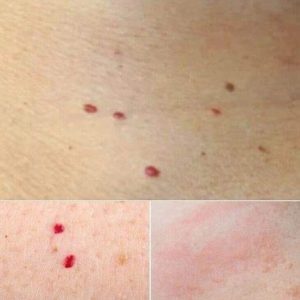 If you’re in the 45–65 age range like me, you’re probably always on the lookout for changes in your body. It’s important to stay alert and take action if anything seems off. So, you can imagine my surprise when I noticed a cluster of red dots on my shoulder one morning. Naturally, like most people, I turned to the internet for answers.
If you’re in the 45–65 age range like me, you’re probably always on the lookout for changes in your body. It’s important to stay alert and take action if anything seems off. So, you can imagine my surprise when I noticed a cluster of red dots on my shoulder one morning. Naturally, like most people, I turned to the internet for answers.
Red dots on the skin are actually quite common and can arise from various causes. If you ever find yourself in a similar situation, here’s a list of some common causes of red dots to consider. Keep in mind, these dots can vary in size, shape, and color, and while some are harmless, others could signal underlying health issues.
Common Causes of Red Dots on the Skin:
Petechiae and Purpura
These are tiny red dots that appear due to broken blood vessels or capillaries. They can result from stress, coughing, or certain medications. Though typically harmless, they can sometimes indicate a platelet disorder.
Cherry Angiomas
Small, raised, and bright red, these bumps are caused by an overgrowth of blood vessels. They’re benign and more common with age.
Heat Rash
Occurring when sweat becomes trapped in sweat ducts, heat rash results in itchy red dots and is a common, harmless condition.
Allergic Reactions
Exposure to allergens—such as food, substances, medications, or insect bites—can cause red, itchy rashes to develop on the skin.
Folliculitis
This is the inflammation of hair follicles, often caused by bacterial or fungal infections. It can appear as red, pus-filled bumps and can be uncomfortable.
Cellulitis
Abacterial skin infection causing redness, swelling, and warmth. It usually requires antibiotics and medical attention.
Impetigo
A contagious bacterial infection that mostly affects children, characterized by red sores that ooze and form a crust.
Vasculitis
Inflammation of blood vessels that may cause red spots on the skin, sometimes linked to autoimmune disorders or infections.
Hemangiomas
These are birthmarks caused by abnormal blood vessel growth. They are generally harmless but can occasionally require medical attention.
When to Seek Medical Attention:
It’s important to consult a healthcare professional if:
The red dots are accompanied by fever, pain, or discomfort.
They rapidly increase in size, number, or intensity.
You experience other symptoms like fatigue, weakness, or dizziness.
Taking care of your health is always worth the effort—better to be safe than sorry!
